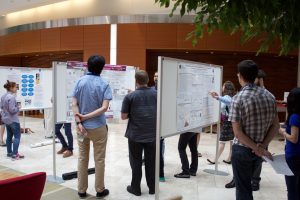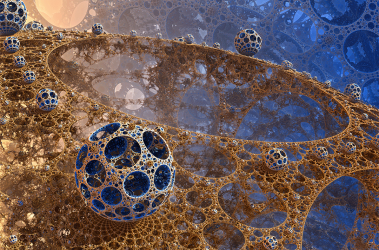As the New Horizons spacecraft passed by Pluto and snapped some breath-taking photos in mid-July, many heads turned to the sky. Gazing into the vastness of space evokes a number of existential questions, one of which is inexorably, “are we alone in the Universe?”
A question so profound and weighty is necessarily beyond the bounds of any one scientific discipline. A problem of such magnitude requires a new brand of inquiry, a brand that is emerging at the Wisconsin Institute for Discovery: transdisciplinary science. Transdisciplinary research reaches across the barriers between disciplines and departments, borrowing methods and insights and applying them in innovative ways while building a unified body of knowledge that goes beyond any specific discipline. This model of investigation focuses on important questions, looks beyond incremental science, and brings together researchers who may never otherwise connect.
The questions surrounding life in the Universe constitute a transdisciplinary challenge that demands contributions from fields including astronomy, physics, chemistry, geology, and biology. Astrobiology relies on researchers across this broad spectrum of disciplines to investigate life in the Universe, including its origins, distribution, evolution, and ultimately, its future.
The recent Astrobiology Graduate Conference brought together up-and-coming scientists for conversations in the collaborative space of astrobiology. Because transdisciplinary research is firmly rooted in WID’s DNA, the Institute was a natural fit as a host for the 2015 edition of the conference in cooperation with the UW Department of Geoscience, the NASA Astrobiology Institute, and SAGANet.

The conference, which took place July 19 to 23 in the Discovery Building and other UW campus locations, featured talks, poster sessions, and conversations amongst young researchers from fields incorporated in astrobiology. Thiru Reddy, a graduate student in the Department of Geoscience at UW, studies isotopic signatures as indicators of early life and was one of the conference organizers. She notes, “before you can study life in the Universe, there’s a lot of analogies you have to prepare from here [on Earth]… That requires a combination of chemistry, physics, geology, and biology.” That, for Reddy, is the most exciting thing about the Astrobiology Graduate Conference. “We don’t only have geoscience people. We have people from chemistry, we have one or two from engineering, we have people from biochemistry; it’s different sciences coming together, which rarely happens,” says Reddy.
…it’s different sciences coming together, which rarely happens. — Thiru Reddy
Conference topics ranged from the historical topography of Mars and the chemical origins of planetary systems to ancient RNA and life in extreme environments. Participants at the conference explored the early history of life in the Universe, where they may find habitable planets, what those planets and the possible life they support might look like, and where the field is heading next.
The conference also focused on professional development – the entire conference was planned and run by post-docs and graduate students – and outreach. On Monday night, for example, the group helped host a showing of Wall-E on the Memorial Union Terrace while answering any and all questions at their “ask an Astrobiologist” booth. The science of space, and more specifically the search for extraterrestrial life, is compelling and captivating even to those who have never heard of astrobiology. As the field grows and matures, exciting discoveries are inevitably just on the horizon. Indeed, just as the conference was kicking off, famed physicist Stephen Hawking announced a new $100 million effort in the search for life beyond Earth.
The Astrobiology Graduate Conference is a launching pad for the next generation of scientists as they continue the search for and study of life in the Universe, transcending the boundaries of their departments and forging forward in the journey of discovery.
— Nolan Lendved


You must be logged in to post a comment.